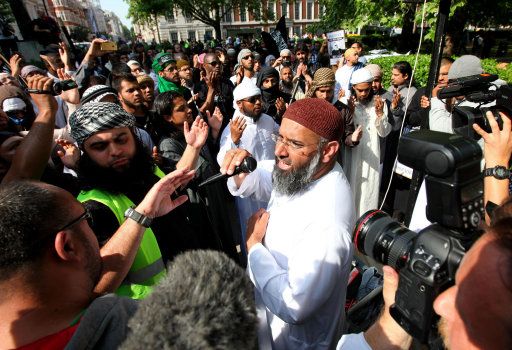Well, it finally happened. After almost two decades of preaching divisive hate everywhere from shopping malls to embassies to the proverbial street corner, Anjem Choudary has been tried and found guilty of inviting support for a terrorist organisation.
Choudary, often described as a “radical preacher,” had, in actuality, no religious qualifications. He was a political activist who, together with Islamist militant leader, Omar Bakri Muhammad, co-founded the Salafi Wahabi organisation, al-Muhajiroun in 1986. After Muhammad fled the UK after the 7/7 attacks (he is now in prison in Lebanon), Choudary stepped—willingly— into the limelight. His goal was simple: to turn the world, and specifically, the British state into one Islamic Caliphate ruled, accordingly, under Sharia Law.
Choudary’s worldview was binary: divided simply into the world’s of Dar al-Kufr and Dar al-Islam (world of disbelief and world of Islam). One of his favourite sayings was that “The flag of Islam will fly over Downing Street”. You were either with him or against him: a good Muslim or a Kafir (unbeliever)—damned and deserving of your fate.
But Choudary was smart. For years, police said he stayed "just within the law." He lectured and made speeches on the need for a caliphate, on the perniciousness of non-Muslims, but he never publicly encouraged acts of violence. Instead, he poured his hate into the minds of the young and impressionable. Men like Omar Sharif, a British suicide bomber who was involved in the killing of three people at the bar “Mike’s Place” in Tel Aviv in 2003, and Michael Adebolajo, who alongside Michael Adebowale, murdered the British soldier, Lee Rigby in Woolwich in May 2013 were acolytes of Choudary; they took his words to their logical conclusion. But Choudary never gave any orders; he never called openly for murder.
His problem came with the emergence of Islamic State (IS) in 2014. Here was a globally proscribed terrorist group that has fulfilled (in parts of the Middle east) what he had advocated for almost 20 years. So he had no choice but to publically support it or risk losing face amongst his followers.
The inevitable happened. One of them, Siddhartha Dhar, skipped police bail, and went to Syria, where he was later photographed with a baby in one arm and assault-rifle in the other This gave the Crown Prosecution Service its chance to act, charging Choudary under Section 12 of the Terrorism Act 2000 not because he backed the idea of a caliphate in principle, but because he had invited others to support a terrorist organisation.
Choudary’s case has since raised two questions. The first is one about the limits of free speech. According to Rashad Ali, Resident Senior Fellow at the Institute for Strategic Dialogue and counter terrorism practitioner, “it demonstrates that we don't believe free speech is limitless. It’s clear that there are limits: in terms of incitement to violence and also specific terrorism-related offenses, which include supporting and inviting people to support terrorism. In this instance, it was not a mere religious idea and [the] expressing of it, but specifically affiliating to IS and encourages others to do so.”
The second issue concerns how Choudary was allowed to stay at large for so long. His poison was clearly radicalizing young men and women. Why didn’t the police act sooner? One answer that has found popularity in certain circles is the “honeypot theory”: that police let him stay at large so that he and people around him could be tracked by the security services.
Ali is unequivocal on this question: “I don’t think it matters whether it is true or not,” he says. “The reality is that he was a honeypot, or perhaps more correctly a light attracting foolish moths, who got duly burned by their association.”
But unlike others, who for years viewed Choudary as largely a clown, Ali considers him a significant figure. “He was significant in a number of respects,” he told me. “We know from our work with individuals and also public IS- released documentation that confirms the group directed individuals through Choudary and his wider network to Omar Bakri Mohammed.”
“So one of the key players in the network of recruiters, propagandists and leadership has been stopped. This will make a significant difference to the offline aspect of IS’s recruitment and radicalisation.”
It seems that Choudary’s day has deservedly—and finally—come.
Why was Anjem Choudary allowed to stay at large for so long?
He is smart—which is why his imprisonment matters
August 19, 2016

Anjem Choudary in une 2014 ©Gareth Fuller/PA Wire/Press Association Images











